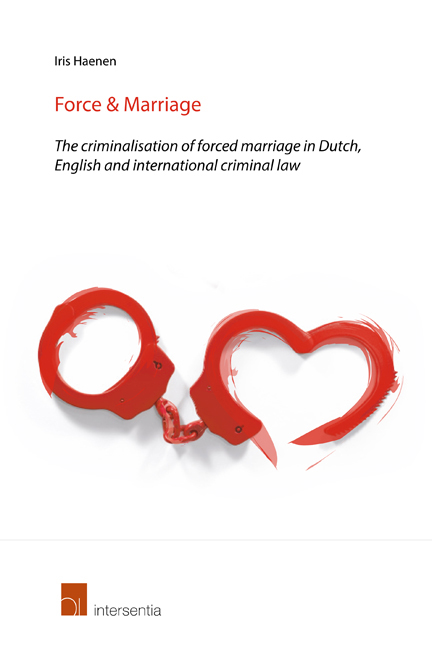 Force & Marriage
Force & Marriage Book contents
- Frontmatter
- Acknowledgements
- Contents
- Abbreviations
- General introduction
- PART I FORCE AND MARRIAGE: Description and definition of forced marriage
- PART II A TALE OF TWO THEORIES: Criminalisation on the level of national law and international law
- PART III THE LAW AND FORCED MARRIAGE: Legal frameworks concerning forced marriage in Dutch, English and international criminal law
- Chapter 7 Dutch and English law and forced marriage
- Chapter 8 International criminal law and forced marriage
- Chapter 9 Two-level legal comparison
- PART IV ANALYSIS AND CONCLUSIONS
- Summary
- Bibliography
- Table of cases
- Curriculum vitae
- Index
Chapter 9 - Two-level legal comparison
from PART III - THE LAW AND FORCED MARRIAGE: Legal frameworks concerning forced marriage in Dutch, English and international criminal law
Published online by Cambridge University Press: 22 November 2017
- Frontmatter
- Acknowledgements
- Contents
- Abbreviations
- General introduction
- PART I FORCE AND MARRIAGE: Description and definition of forced marriage
- PART II A TALE OF TWO THEORIES: Criminalisation on the level of national law and international law
- PART III THE LAW AND FORCED MARRIAGE: Legal frameworks concerning forced marriage in Dutch, English and international criminal law
- Chapter 7 Dutch and English law and forced marriage
- Chapter 8 International criminal law and forced marriage
- Chapter 9 Two-level legal comparison
- PART IV ANALYSIS AND CONCLUSIONS
- Summary
- Bibliography
- Table of cases
- Curriculum vitae
- Index
Summary
INTRODUCTION
Specific legislation criminalising the act of forcing someone to enter into a marriage is on the rise. During the past decade, many European countries, including Belgium, Norway, Denmark, Germany, Austria and England (as of 2014), have introduced a specific offence of forced marriage in their criminal laws. On the international level, the Sierra Leonean bush wife phenomenon sparked the question of whether forced marriage ought to be classified as a ‘new’ crime against humanity (i.e. as an ‘other inhumane act’), or whether it is caught by existing crimes against humanity such as (sexual) enslavement.
In the previous two chapters, the legal landscapes of Dutch and English criminal (and civil) law and international criminal law were described; in this chapter, they will be compared with each other on two different levels. The first part of this chapter (paragraph 2) compares the English and Dutch legal landscapes with each other. In England as well as in the Netherlands, the fight against forced marriages is high on the political agenda: MPs and NGOs have examined existing and new measures that could be taken to tackle this phenomenon and discussions on involving the criminal law have resulted in new legislation in both jurisdictions. What will be demonstrated below is the large overlap in available measures when it comes to dealing with (intended) forced marriages. Specific legislation comparable to the FMCPA does not exist in the Netherlands. Nevertheless, as will become evident, there are several comparable measures in Dutch law. Two landscapes that at first glance seem very different, appear, upon closer inspection, to have many similarities.
The second part of the chapter (paragraph 3) compares the national legal frameworks with the international framework.
LEVEL 1: COMPARING DUTCH AND ENGLISH LAW
THE STARTING POINT: A DIFFERENT POLICY AND DIFFERENT LEGISLATION
The quintessential difference between the legal measures in the Netherlands and in England described in Chapter 7, is that England has specific civil and criminal legislation for dealing with forced marriages and even has a special taskforce that deals exclusively with cases of (threatened) forced marriage. There are several explanations for the differences between the English and the Dutch forced marriage policy.
- Type
- Chapter
- Information
- Force & MarriageThe criminalisation of forced marriage in Dutch, English and international criminal law, pp. 287 - 306Publisher: IntersentiaPrint publication year: 2014


